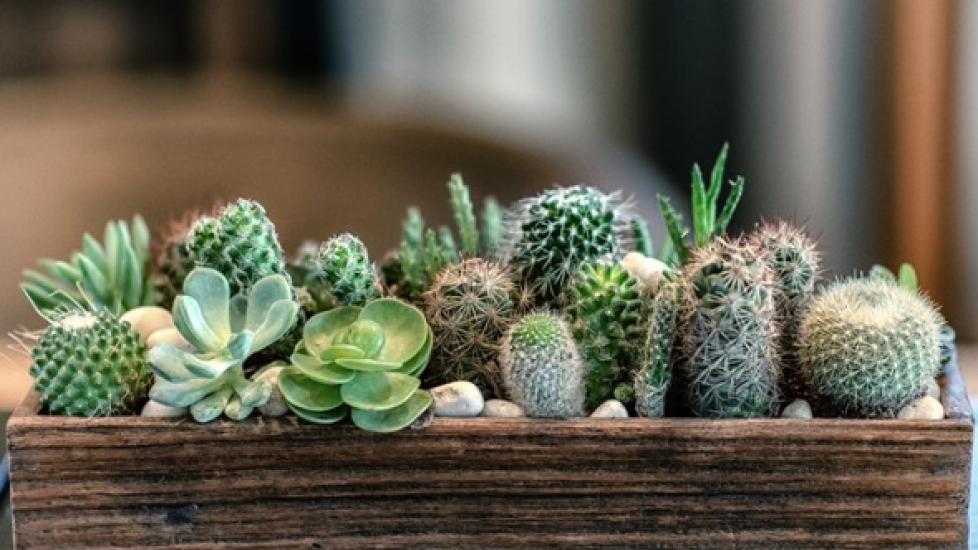Are Succulents Poisonous to Cats and Dogs?
Succulent plants are popular options because they are easy to care for and work well as houseplants.
Marked by their thick, fleshy leaves, succulents are native to desert environments but adapt easily to a variety of conditions.
These hardy plants can thrive both indoors and outdoors, making them a favorite among both experienced gardeners and budding green thumbs.
While succulents can be great, low-maintenance houseplants for humans, they are not always a great option if you have furry family members.
If ingested, some varieties of this trendy plant could harm cats and dogs.
Most succulents are nontoxic to our pets, but some are dangerous and even poisonous.
Succulents That Are Poisonous to Dogs and Cats
If you have a dog or cat in your household, you should steer clear of the following varieties of succulents.
Aloe Vera
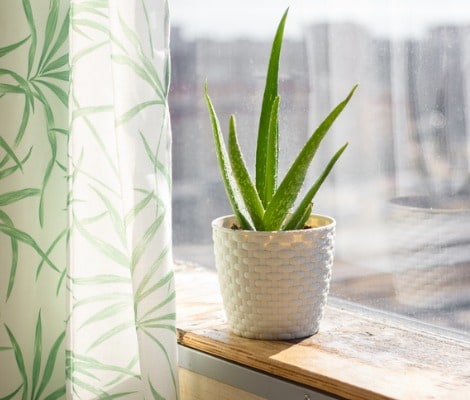
Image via iStock.com/ek_kochetkova
One of the most popular succulents, aloe vera is frequently used for medicinal and therapeutic purposes. Its sap is traditionally used to treat sunburns, and the plant’s extracts can be found in supplements, cosmetics, and flavored waters.
However, this succulent can be poisonous to pets. Aloe is known to cause gastrointestinal distress, such as vomiting and diarrhea, even making the pet lethargic.
Aloe plants are characterized by long, spiked tendrils. Some varieties have white spotted foliage, while others flower periodically. All varieties should be kept away from pets.
Kalanchoe
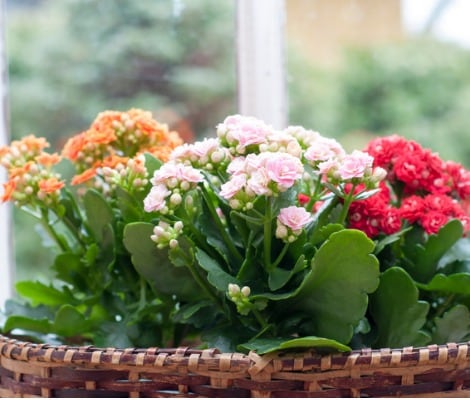
Image via iStock.com/artursfoto
Kalanchoes are beloved for their plentiful blossoms, ranging in color from pale pink to fiery orange. Popular as a houseplant, this tropical succulent is known by a number of nicknames, including devil’s backbone, mother of millions, and mother-in-law plant.
This plant is predominantly a gastrointestinal irritant, causing vomiting and diarrhea. However, heart arrhythmias can also occur.
If your pet ingests kalanchoe, seek immediate veterinary care.
Euphorbia
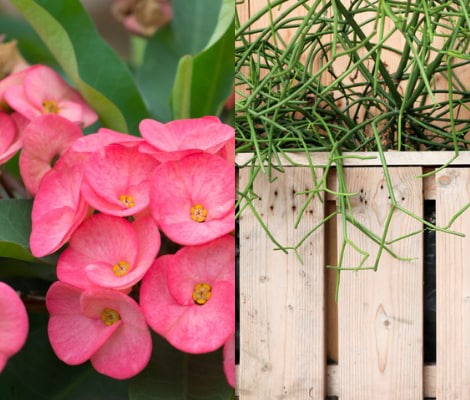
Images via iStock.com/joloei and iStock.com/vichuda
A large, diverse genus, euphorbia includes plants ranging from tiny, low-growing plants to sprawling trees.
Many succulents in the euphorbia genus, such as the pencil cactus and crown of thorns, are poisonous to both cats and dogs.
Symptoms of poisoning from ingesting this succulent range from gastrointestinal upset to skin and eye irritation.
If you have pets, it is best to avoid any plant in the euphorbia genus, including the poisonous poinsettia.
Jade
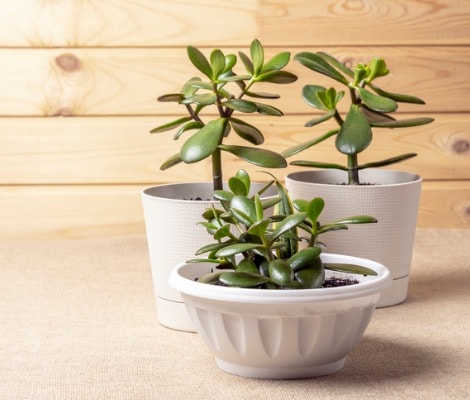
Image via iStock.com/Andrey Nikitin
Like aloe vera, jade is a common, easy-to-grow houseplant that can be found on many windowsills. Jade plants have thick, woody stems and plump, oval leaves, giving them a tree-like appearance.
There are a number of varieties of jade—and all should be kept out of reach of pets. If your cat or dog ingests jade, they may experience symptoms including gastrointestinal upset and incoordination.
Succulents That Are Safe for Cats and Dogs
If you are really looking to expand your plant collection and think succulents are the way to go,you can consider the following:
Hens and Chickens
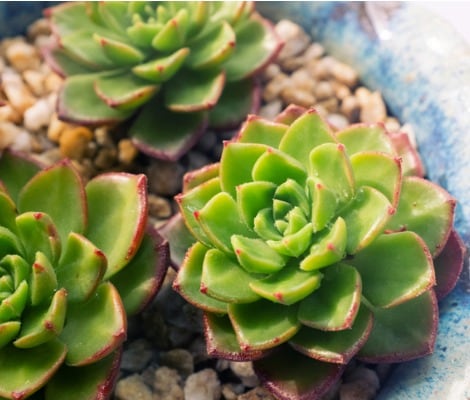
Image via iStock.com/hudiemm
Also known as houseleek, hen and chickens (hen and chicks for short) among the most popular succulents, and for good reason.
Famously low-maintenance, they thrive everywhere from planters to rock gardens to succulent wreaths. The main plant—aka the “hen”—is connected to the smaller offshoots (her “chicks”) through small, delicate roots, making for a visually appealing display.
Haworthia
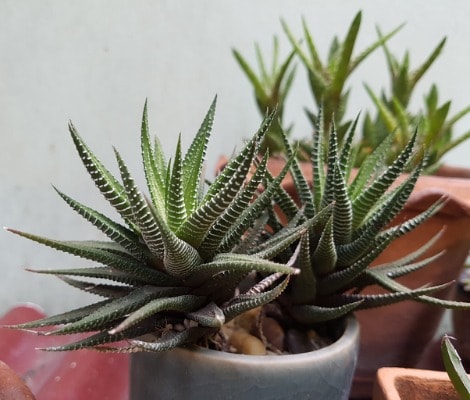
Image via iStock.com/arraymax
If you’re a fan of aloe vera’s spiked silhouette, consider a haworthia instead. Also known as the zebra cactus, this easy-to-grow succulent has a similar appearance but is nontoxic to pets.
Burro's Tail
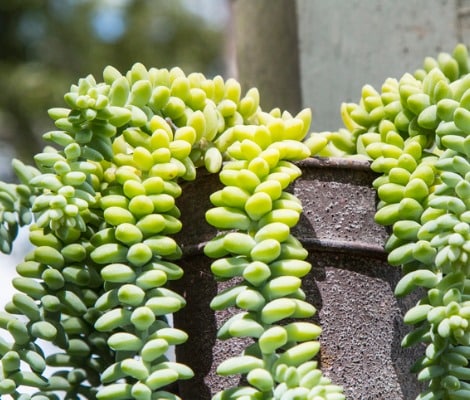
Image via iStock.com/jerryhopman
With lush trailing tendrils, the burro’s tail is perfect for displaying in hanging planters and on shelves. Although it doesn’t usually bloom, some plants will offer pink or red flowers under perfect conditions during the summer.
Protecting Your Pets From Toxic Plants
With thousands of varieties of succulents and increased availability of exotic plants, the best way to protect your pets is to identify exactly which plants are poisonous to dogs and cats, and refrain from bringing them into your home.
Before buying a new plant, check the ASPCA’s extensive poisonous plant database as well as the Pet Poison Helpline’s toxicity list.
If you already have plants in your home and garden, look up each one to verify that it is safe for pets.
It’s also important to note that any plant, toxic or not, can cause problems for pets.
Even non-toxic plants can cause gastrointestinal upset when ingested, especially for pets with sensitive stomachs. Other plants can even have chemicals or pesticides on their leaves, causing additional issues with pets. Pets should always be discouraged from eating plants in the house.
It is helpful for pet parents should know the names of every plant in their home—including nicknames and Latin names.
If your pet does end up eating one of your nontoxic plants, or happens to eat a plant that could be poisonous while on a walk or while visiting a friend’s home, the best thing you can do is to first identify the plant.
Many veterinarians would have difficulty identifying many dangerous species of succulent. It is best to know the plants in your home and if a pet ingests an unknown plant, look it up immediately for potential toxicity and call your veterinarian immediately.
Before an incident occurs, you can familiarize yourself with some of the most common poisonous plants for dogs and cats that grow in your area or that friends might have as houseplants.
If you have any doubt whatsoever as to whether a plant is poisonous to pets, call one of these animal poison control hotlines:
- ASPCA Animal Poison Control Center: 888-426-4435
- Pet Poison Helpline: 855-764-7661
Featured Image: iStock.com/ae0816146146
